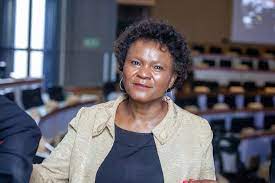Yakhe Kwinana was a South African anti-apartheid activist and politician, who played an integral role in the fight against the oppressive apartheid regime in the 1980s and 1990s. Born on 1 September 1954 in Langa, Cape Town, Kwinana was the daughter of a carpenter and a domestic worker. She grew up in a working-class family and attended school in Cape Town.
Kwinana’s activism began in the late 1970s when she joined the Black Consciousness Movement (BCM). She was particularly drawn to the movement’s philosophy of black pride and self-reliance, which encouraged black people to take control of their own lives and reject the inferiority complex imposed on them by the apartheid regime. In 1977, Kwinana became a member of the Azanian Students Organisation (AZASO), a BCM-affiliated student group that sought to mobilize young people against apartheid.
Kwinana’s activism intensified in the 1980s, as the anti-apartheid struggle gained momentum. She became an organizer and leader in the United Democratic Front (UDF), a coalition of anti-apartheid organizations that aimed to mobilize people across all sectors of society against apartheid. Kwinana played a key role in organizing mass protests, boycotts, and strikes, and she was known for her tireless work in the townships of Cape Town.
Kwinana’s activism also brought her into conflict with the apartheid authorities. She was arrested several times and spent periods in detention without trial. In 1985, Kwinana was detained for several months under the notorious Internal Security Act, which allowed the government to detain people indefinitely without trial. She was subjected to torture and interrogation, but she refused to betray her comrades or renounce her beliefs.
After her release from detention, Kwinana continued to be active in the struggle against apartheid. She became a member of the African National Congress (ANC) and was elected to the Western Cape Provincial Legislature in 1994, following South Africa’s first democratic elections. Kwinana served as a member of the provincial executive council, responsible for housing and local government, until 1999.
In addition to her political work, Kwinana was also involved in community development initiatives. She worked with organizations that provided housing, health care, and education to disadvantaged communities, and she was a strong advocate for women’s rights.
Tragically, Kwinana’s life was cut short in 1999 when she was killed in a car accident at the age of 45. Her death was a great loss to the anti-apartheid movement and to the people of South Africa. Kwinana’s legacy lives on, however, in the struggle for social justice and human rights. She remains an inspiration to all those who continue to fight for a more just and equal society.





Leave a Reply